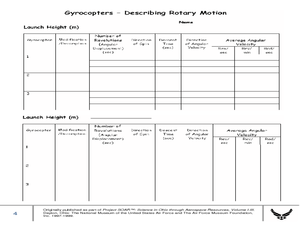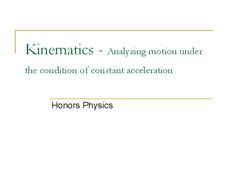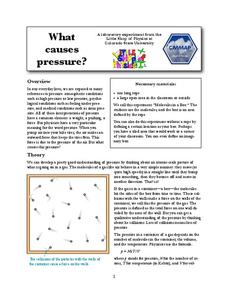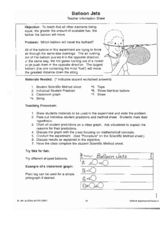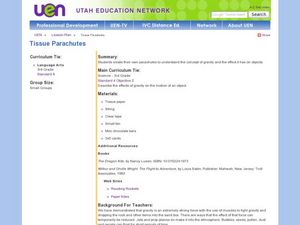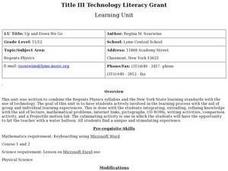Curated OER
Physics Rewind
Eighth graders differentiate speed and velocity. In this physics instructional activity, 8th graders explain Newton's laws of motion. They calculate speed using a mathematical formula.
Curated OER
Gyrocopter - Describing Rotary Motion
Learners calculate angular displacement, velocity and acceleration of gyrocopters. In this physics lesson plan, students compare data taken from 3 different gyrocopters. They explain how differences in construction material affect...
Curated OER
Motion Through the Ages
Eighth graders conduct internet research to produce a timeline of man's growth in understanding of concepts of motion and planetary motion through history.
Curated OER
Bounce (Projectile Motion And Collisions)
Students analyze the motion of an object as it moves through a complex path that includes rolling, falling, and bouncing. They answer questions related to what forces are acting at any given time.
Curated OER
Temperature and Thermal Energy
Examine how heat can be transferred between systems by reconstructing a diagram on energy flow and solving problems on heat flow and work done.
It's About Time
The Mu of the Shoe
What is mu? Emerging scientists explore the coefficient of sliding friction, or mu, and apply its concepts as they complete activities in the interesting lesson. They measure the sliding friction between soles of their own athletic shoes...
Exploratorium
Marshmallow Puff Tube
Let physical science stars experience Newton's first law of motion by blowing marshmallows out of cardboard tubes! Using different lengths of tubing, they find that more force is needed to overcome increasing friction, and they have a...
Virginia Department of Education
Sound
Add a little music to your next physics class. Pupils discuss how frequency determines pitch and take part in several activities designed to teach them more about sound, melody, resonance, and vibrations. They use materials to construct...
University of Southern California
What Is The Ocean?
Go on a tour of the ocean through the lens of a scientist. Learners read maps of the ocean floor, study tide behavior, examine wave motion, and analyze components of soil. Each lesson incorporates a hands-on component.
Bowels Physics
Kinematics
Lead your class on a speedy journey as you present an effective lesson on kinematics. Individuals review speed, acceleration, and velocity before completing several practice problems to integrate the concepts.
Bowels Physics
Newton's Second Law
Were it not for Sir Newton, our understanding of physics and matters of the world would be drastically different. Present your class with detailed information of Newton's Second Law as they explore the concepts of mass and acceleration....
Colorado State University
What Causes Pressure?
Are you feeling the pressure? Let loose a little with a kinesthetic activity that models molecular motion in a closed space! The activity varies conditions such as volume and temperature and examines the effects on molecules.
Curated OER
Balloon Jets
Students investigate how fuel amount affects the distance traveled by balloons. In this physics activity, students collect data and create a pictograph. They interpret data and formulate a conclusion.
Curated OER
Motion and Gravity
Third graders make parachutes to learn about gravity and the science process. In this gravity lesson, 3rd graders create parachutes and observe their flight in air. Students discuss wind and gravity for the activity.
Curated OER
Race the Track! Super Slope (Lesson One)
Fifth graders utilize basic physics concepts to calculate speed of an object set in motion from various heights. In this basic physics lesson, 5th graders make observations, calculations, record data, and conclusions throughout experiment.
Curated OER
Hot Wheels
Students observe the action produced by toy cars. In this geometry lesson, students discuss motion and distance as they relate to the movement of a spherical object.They collect data and make conjectures based on their data.
Curated OER
Up and Down We Go
Students explore physics concepts such as velocity, acceleration and speed to create a model of a safe roller coaster. They design and conduct a lab to demonstrate the properties of an object fired horizontally and at an angle.
EngageNY
Construct and Apply a Sequence of Rigid Motions
Breaking the rules is one thing, proving it is another! Learners expand on their previous understanding of congruence and apply a mathematical definition to transformations. They perform and identify a sequence of transformations and use...
Fall River Schools
Parabolas Are All Around Us
Moving parabolas off of graph paper and into the real world is the task at hand in this detailed poster project. First, learners perform a cumulative activity identifying many characteristics of an assigned quadratic equation. Next, they...
Curated OER
Typical Conceptual Questions for Physics I - Heat
This instructional activity would make a nifty quiz on the laws of thermodynamics. Nine multiple choice questions assess high schoolers' understanding of energy transfer, specific heat capacity, phase change, fusion, and vaporization. It...
Institute of Electrical and Electronics Engineers
Fun with Speedboats!
After reading about marine engineers and naval architects, it's all hands on deck to design and test a speed boat. This lesson is designed for the Next Generation Science Standards in engineering and can be a centerpiece for a STEM...
National Science Teachers Association
Paper Car Crash Design
High school physical scientists collide with motion. They work in pairs to design a paper car that will protect a raw egg during a head-on collision. Measurements of distance traveled, time of run, vehicle specs, and photo gate flags are...
Curated OER
Introduction to Forces and Inertia
Students explore the basic underlying concepts of Newton's first law of motion. They discuss forces and brainstorm different examples of force and what they act on. Students examine force by observing springs and gravity. They discuss...
Curated OER
Balloon Rocket
Students observe a balloon rocket and how it relates to Newton's Third Law of Motion. In this balloon rocket lesson plan, students make a balloon rocket out of balloons, clothespins, straw, fishing line, and duct tape.



